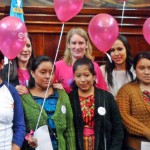9th March 2015
Gender Equality, there is still much more to be done…
To commemorate International Women’s Day I have invited Rita Grajeda, Human Rights Officer, and Sara Del Cid, Security and Justice Officer, to share some thoughts about the work the Embassy is doing in Guatemala to promote gender equality. Over to you Sara and Rita…
To be able to work for gender equality it is necessary to be clear where we are today and what remains to be done. According to UN-Women, worldwide there are 45% fewer maternal deaths than in 1990, but 800 women still die every day from preventable pregnancy-related causes. The percentage of women in parliament worldwide has nearly doubled in the last 20 years, but this only translates into 22% of women in parliament today. At least 50% of the world’s women are in paid employment, but women still earn 10-30% less than men for the same work. All developing regions have or have almost achieved gender parity in primary education, but the gender disparity widens at the secondary school levels in many countries. 20 years after the UN Declaration on the Elimination of Violence Against Women, 1 in 3 women still experience physical or sexual violence.
In Guatemala the Embassy has prioritised four main topics: 1) prevention of sexual violence, 2) child marriage, 3) prevention of maternal deaths and 4) strengthening of women’s empowerment. To prevent sexual violence it is important to understand the continuum of sexual violence from the past to the present – sexual violence was used as a weapon in the Guatemalan armed conflict. In order to promote prevention and to empower victims and survivors of sexual violence to improve communication within the community by breaking taboos, we have been working with the National Union of Guatemalan Women (UNAMG) and ‘Working Artists’. Closely associated with this is child marriage. On this we are part of a lobbying campaign, being led by Plan International Guatemala, to raise the minimal age for marriage to 18. Currently girls are permitted to marry at the age of 14 – or less when they are pregnant as long as they have their parents’ (or judicial) authorisation. Statistics and reports have shown that this legal loophole allows early and forced marriage that in many cases hides sexual violence – girls marry men who sometimes are triple their age. The Embassy is working with civil society to promote innovative mechanisms to improve maternal health in rural areas. This is achieved through mobile technology that we hope will be of great use and benefit for the population.
To strengthen indigenous women’s economic and political leadership skills and potential we have organised workshops to address women’s involvement in local political movements and the status of their representation in the upcoming general election process in Guatemala. Participants discussed the lack of economic opportunities for indigenous women, which is linked to very low education rates: only 15.6% of Guatemala’s female population are educated to at least secondary school level, compared to 21% of males. Patriarchal traditions remain strong in Guatemala which often ties women to a domestic role, but tough economic conditions may push women into working long hours for very little reward. There is still much more to be done, but we feel very proud of the contributions we are making to support gender equality in Guatemala and to be part of the change!
